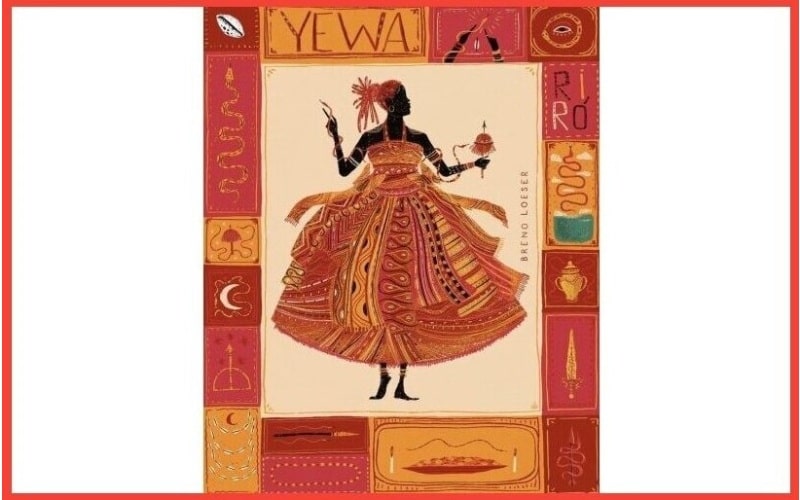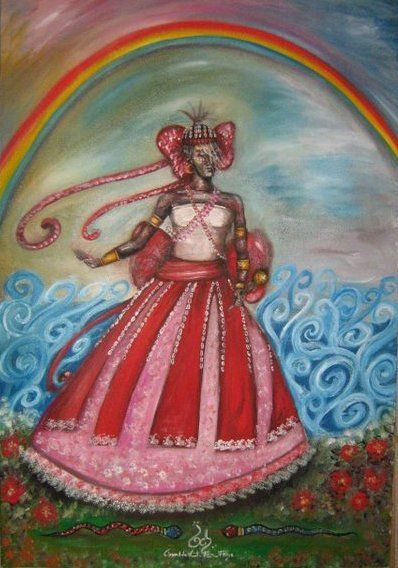Shrouded in mystery, Yewa is a recluse orisha that lives in the graveyard along with her sister Oya. Together, these two Orishas rule over the cemeteries and make sure that there is no mixing between the worlds of living and dead. Still, Yewa wasn’t always spending her days and nights surrounded by graves. Once upon a time, her life looked quite different.
So, how did she end up in the graveyard? After all, spending so many years around the dead doesn’t sound very lucrative, even for an orisha or a goddess. The most obvious answer is, “Well, someone has to do it.”
However, I believe there is a deeper meaning to Yewa’s stay in the graveyard. Sometimes, the world of living is too cruel. Many people whose hearts are still beating fully deserve to be called heartless. With that in mind, it is a bit easier to understand Yewa’s reasoning behind withdrawing from the world of living.
Yewa’s Origin Story – The Cruel Twist of Fate
Just like with other deities from the Yoruba/Santeria religions, there are several different origin stories for Yewa, also known as Yeggua, Yegua, and Ewa. The first one that I’m going to share with you is especially tragic.
Seduction Gone Wrong
According to this version, Yewa was a simple young girl that was still a virgin and quite naive. She was also very beautiful, and her chastity invoked curiosity in many men that wanted to possess her.
Even the orishas felt enamored by Yewa, and to be more specific, Shango was the one who fell in love with her. He was a notorious womanizer who had already seduced many girls, women, and even female orishas.
Like a lamb is an easy prey for a wolf, Yewa was too naive and fell for Snago’s seduction. She fell pregnant, but Shango was nowhere to be found. She felt alone, used, humiliated, scared, and desperate.
That’s when Boromu, the orisha of the desert, guardian of the cemetery and bones, came into the story. He offered to help Yewa to end the pregnancy by giving her a herbal potion to drink. After she drank the potion, Yewa aborted very soon and buried the fetus under a tree.
Moving on from trauma
Devastated and traumatized, Yewa decided to exile herself into the cemetery. Meanwhile, Boromu went to Olokun and told him everything that had happened. The two of them went to the tree where Yewa’s fetus was buried, and Olokun resurrected its spirit. The child was named Borosia, and later served as a guard at Olokun’s court.
What happened next remains a bit ambiguous. In one version, Yewa continues her life in the cemetery, and Boromu goes back to his usual. However, in another version, Boromu and Yewa get married.
It is also not clarified whether this marriage happened in order to save Yewa’s honor or because Boromu was genuinely in love with her. This also makes his motives to “help” her dubious. Did he give her that potion to help her end an unwanted pregnancy or because he wanted her for himself?
Sneaky Shango
This is another version of Yewa’s origin story, and it is a bit less tragic than the first version, but it has the same culprit: Shango. Yewa was the daughter of Obatala, another powerful orisha that was responsible for creating mankind.
Additionally, Obatala was a god of purity, and his daughter decided to follow in his footsteps. Yewa was determined to keep her chastity vow and remain a virgin forever. That’s why she decided to abandon the mortal world and live an isolated life in her father’s crystal palace.
However, her peace didn’t last for long. Shango heard about a beautiful virgin orisha living in her father’s castle, hidden from everyone. He felt tempted to find and seduce her. But, to get even close to Yewa, Shango had to be smart.
That’s why he sneaked into the gardens of Obatala, where Yewa would come for occasional walks. After some time, Yewa arrived, and Shango could finally see her beauty in its full glory. However, Shango wasn’t the only one who was mesmerized by what he saw.
Love at first sight
Once she saw Shango, Yewa experienced emotions she had never felt before – love, lust, and passion. Confused, ashamed, and scared, Yewa quickly ran away back to her father’s palace.
Even though she did nothing wrong, Yewa still felt guilty about her emotions. She felt like she had broken her vow. That’s why she went to her father and confessed what happened, in the hope of getting a piece of good advice on what to do next.
Obatala was also confused by this whole situation. As the god of purity, he had to reprimand his daughter for this minor indiscretion, but on the other hand, he loved her and didn’t want to make the whole situation even more difficult for her.
That’s why he finally came up with a foolproof plan that would protect his daughter’s chastity from everyone, even from Shango. Yewa was sent to the realm of the dead, where she was appointed as a cemetery guardian. She was finally able to keep her vow without any distractions because no one, not even Shango, dared to enter the realm of the dead.
Yewa’s Role In Santeria Religion
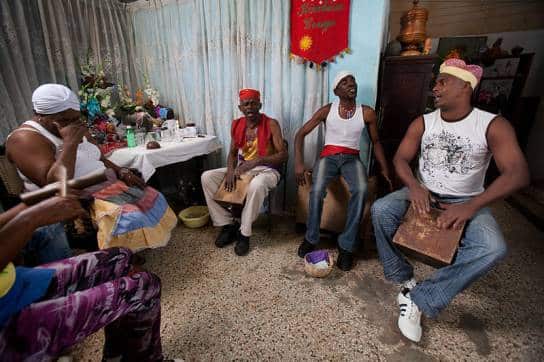
I already said that Yewa is known for protecting the graveyards along with her sister Oya. However, that wasn’t always her main role.
The Transition and The Symbolism Behind It
In the Yoruba religion, Yewa was initially an orisha connected to water, fertility, and birth. However, she slowly changed into a graveyard keeper that was responsible for keeping the world of the dead separate from the world of the living.
This change was especially noticeable during the transatlantic slave trade. Slaves that arrived on the American continents and their descendants established a new form of religion, Santeria, in which Yewa was only known as the graveyard keeper and the goddess of death.
It seems that Yewa’s interaction with Boromu and potential marriage is a perfect metaphor for this shift in Yewa’s duties. She was the orisha of water and fertility, but once she was used and betrayed by Shango, she accepted Boromu’s help.
Boromu is the orisha of desert and desiccation, the complete opposite of Yewa’s initial duties. He is also closely related to death, and after all, he helped Yewa abort her unborn child.
Once Yewa decided to accept Boromu’s help, she gave up on her role as the orisha of water. When she aborted the fetus growing inside of her, she also gave up on her role as the orisha of fertility.
Graveyard Guardian
Once Yewa settled in the realm of the dead, she accepted various roles that came with that. She dances over the graves and tombs, bringing solace and peace to the deceased souls. Occasionally, she turns into an owl to perform her duties without being noticed by living mortals.
Her role is to take care of recently deceased souls, protect their gravestones, and make sure these souls can safely reach the afterlife. She still values purity and innocence and will often punish those who are trying to harm chaste people.
Additionally, she will punish those that make fun of the dead or try to desecrate their remains in any possible way. But, if you are respectful and well-behaved, you won’t have to worry about experiencing Yewa’s wrath.
Yewa’s Significance for Yoruba People
Despite our main focus being Yewa’s role in the Santeria religion, it is impossible to pay tribute to this goddess without acknowledging her roots. Apart from representing virginity, chastity, and purity, Yewa was also a patron of mothers and women in general.
Her name was actually coined from two Yoruba words, Yeye (mother) and Awa (our). This shows perfectly how revered Yewa was in the Yoruba tribes. One subgroup of Yoruba people from the Ogun state is named Yewa. Finally, one of the biggest rivers in today’s Nigeria, the land of the Yoruba people, is called Yewa.
Yewa’s Relationship to Other Orishas
If you are familiar with other orishas, you probably noticed that there are several different stories about those orishas. Many of those stories contradict each other. As a result, relationships between different orishas often vary from one story to another.
That’s the case with Yewa too, but there are also some constants. Her constant is definitely Shango as her love interest that soils her chastity and eventually forces her to abandon the world of the living. In the world of the dead, Yewa rules over the cemeteries along with her sister Oya.
However, her other relationships aren’t so clear. In one version of her story, she gets married to Boromu, but in the second version, that doesn’t happen. There are also versions in which she never meets him at all!
Regarding her father, Obatala, there are versions of Yewa’s story in which he isn’t mentioned at all. Alternatively, Yewa is sometimes considered to be a female representation/counterpart of Obatala.
Trinity of Death
Also, there is a third sister guarding the graveyards with Yewa and Oya. Her name is Obba, and she is the goddess of mountains and cemeteries. The three sisters rule over the graveyards, transfer deceased souls into the afterlife, and protect the secrets of the dead from the living.
These three sisters might sound like characters from a horror movie, but their role in Yoruba and Santeria religions is much more nuanced than that. While death is a scary concept for most people, it is natural and necessary.
Yewa, Oya, and Obba aren’t some monsters that will haunt you and harm you for no reason. They don’t get to decide who lives or who dies. Their job is just to protect the world of the dead and keep it separated from the world of the living.
Without them, there would be no clear line between those two worlds, and THAT would be a real-life horror movie. Finally, isn’t it comforting to know that you will be protected by three loving goddesses even after you pass?
Yewa’s Appearance
Yewa is often portrayed as a young and beautiful dark-skinned woman. She is often wearing pink veils and a crown made of cowrie shells. Sometimes, Yewa will assume the appearance of an owl to go unnoticed by mortals when performing some of her tasks.
What Not To Do If You Want To Appease Yewa
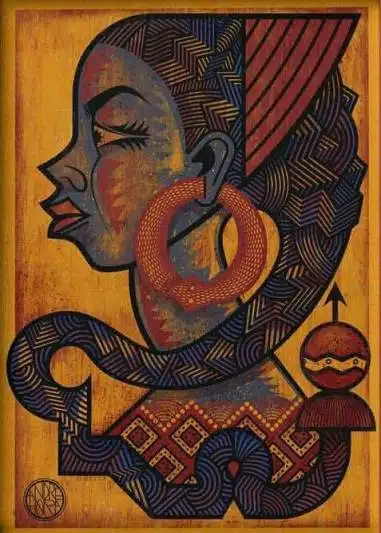
You already know that Yewa can become quite angry and even vengeful towards those that are disrespectful and mean. She is especially protective over the dead and those who are innocent, pure, and virginal.
However, apart from insulting the dead or innocent people, there are also some other ways to make Yewa angry with you. If you want to worship this goddess, or you are simply standing near her image, there are some things you should avoid doing.
For example, since Yewa is the protector of virginity and innocence, don’t swear in front of her image. Don’t engage in sexual activities or talk about sex, even through innuendos. Don’t start a fight, and don’t be mean to other people.
Yewa’s priests and priestesses weren’t allowed to eat anything that came from the sea. However, dishes made with fish can be used as offering to Yewa.
Yewa And Her Christian Renditions
Like many other Santeria deities, Yewa was syncretized with a Christan saint. In particular, with Black Maddona of Montserrat. Black Madonnas are depictions of the Virgin Mary, and in these depictions, Mary has dark skin and other motifs that were not so typical for Christian saints.
Black Madonnas are present in various cultures all around the world, but they are especially popular in Central and South America. There, a Black Madonna is usually depicted in a doll-sized sculpture, with many of those sculptures believed to have healing powers.
Just like Yewa, Black Madonnas represent dark feminine energy that can be scary to some, but it is necessary to keep the cycle of life and death intact and as it should be.
Yewa-Like Goddesses From All Around The World
If you are interested in other goddesses that ooze that dark feminine energy, often closely connected to death and rebirth, you have many such goddesses all around the world. Morena, Morrigan, Nephthys, Freyja, and Hecate are only a few of countless other goddesses you might want to look up.
Another interesting detail caught my attention when learning about Yewa. When she aborted her fetus, she buried it under the tree. From there, this fetus was resurrected by Olokun. In many cultures, trees had magical attributes.
For example, ancient Slavic tribes believed that trees were connected to various deities. The Vikings had Yggdrasil, the cosmic tree of life. Yewa’s decision to bury her unborn child under the tree wasn’t so random. It was her desperate attempt to get help from the gods, and fortunately, she received it.
This detail might seem minor and even random, but it shows how intertwined all cultures are with each other, with nature, and with gods/universe. While Yggdrasil isn’t a goddess, it gives life, just like Olokun and the tree from Yewa’s story.
Legacy
Even though Yewa is quite obscure, the lessons that we can learn from her are extremely valuable. After all, every woman can relate to her story, as we were all once naive and innocent and full of hope.
Unfortunately, just like Yewa, most women have met a man similar to Shango, the one who will sweet-talk his entrance into your heart but disappear soon after he gets what he wants. Of course, there are also men like Boromu, and they will act like they want to help you with your problems, but their intentions will also be questionable.
It is up to each woman to decide how she will protect herself against such men. Will she, like Yewa, isolate herself in a way that no one can hurt her anymore? Sure, that’s one way to do it. However, if you have been hurt by a man or anyone else, you should consider dealing with the pain in a more healthy way.
Another thing caught my attention when reading Yewa’s origin story, particularly the version in which she becomes pregnant and aborts the child. It seems that Yewa had little to no control in both instances. She didn’t want to stay pregnant, and she didn’t want to abort the child, but she felt like she had no other choice at the moment. Her story is a textbook example of how the loss of bodily autonomy can be tragic for a woman.
Finally, Yewa’s story raises an important question about whether it is possible to remain innocent and pure in this corrupted world. Should we become cynical and closed to the world, or is there a way to remain innocent while still being aware of the state of the world?
Symbols
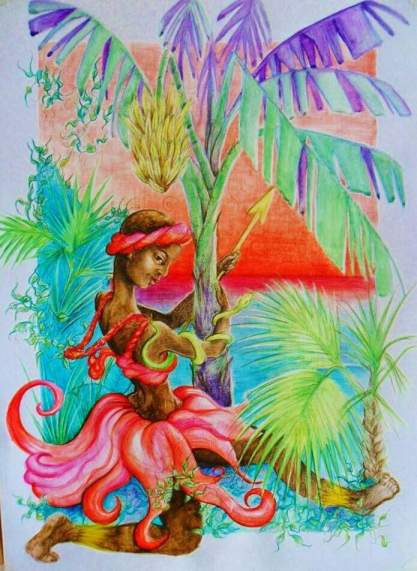
Since Yewa is a goddess of death, water, and virginity, her symbols should represent that. So, if you want to connect with Yewa on a deeper level by surrounding yourself with her symbols, here are some suggestions:
General
Various bodies of water can symbolize Yewa. Water makes us clean and pure, which is another connection to Yewa, the virgin goddess. So, the next time you want to venerate Yewa, you can do it by a nearby river, lake, pond, etc.
Some other symbols that can be used to symbolize Yewa are Fridays, gravestones, and pink veils.
Animals
Owl is a nocturnal animal closely connected to death but also to knowledge and wisdom. As such, it is a perfect symbol for Yewa, especially if you remember that Yewa occasionally transforms into an owl.
Other animals that symbolize Yewa are fish, dolphins, and seashells, especially cowry seashells.
Plants
If you are looking for a plant that will symbolize Yewa, you have several options. For example, a white lotus represents purity and innocence because it stays pure and beautiful even in muddy waters.
Some other plants that can be used as symbols for Yewa are lilies, roses, chrysanthemums, orchids, and meadowsweet flowers.
Perfumes/Scents
Mint, orange, rose, vanilla, bergamot, water lily, and apricot are scents that perfectly capture Yewa’s beauty and innocence, and as such, they are great symbol choices.
Gems and Metals
Pearls are perfect symbols of Yewa because they are pure and perfect, just like she is. Their beauty is unmatched, and nothing can stain it. A similar can be said for diamonds and gold. So, if you want to wear gemstones or precious metals that will remind you of Yewa, these are the best choices.
Goddess Jewelry
There are many great reasons why you might want to keep a healing crystal or stone close to you. That they can look great as jewelry only makes it so much better!
Here is a guide to crystal jewelry you hopefully will find helpful. In it is a list of 30+ crystals and links to some really great looking jewelry with that crystal or stone. Enjoy!
Colors
White is the color of innocence, purity, and virginity, which makes it Yewa’s color. Yewa can also be seen wearing pink veils, which makes a pink color another good choice for a symbol. Alternatively, scarlet color can also be used to represent Yewa’s femininity and beauty.
Embracing the Call of Yewa: Recognizing Her Presence and Cultivating a Sacred Connection
Have you ever felt a profound connection to solitude and spiritual purity, and wondered if it’s more than just coincidence? For many spiritual seekers, the Santeria Orisha Yewa may be extending an invitation to connect. Discover how to recognize the signs of her calling, invoke her presence, and cultivate a meaningful relationship with this powerful Orisha.
How to know if Yewa is calling you
One way to recognize Yewa’s call is through feelings of solitude and spiritual purity. An increased interest in meditation or introspection may be signs. Pay attention to any sudden urges to distance yourself from worldly matters.
Dreams and visions are another way Yewa may reach out. Dreams featuring her or her symbols, like skulls or cemetery imagery, can be significant. Similarly, visions of quiet, secluded places might signal her presence.
Finally, note any synchronicities in your life. Repeated encounters with her symbols or a strong attraction to her stories and mythology can indicate that Yewa is calling you. These patterns may seem coincidental, but they’re worth noting.
Invoking Yewa
To call upon Yewa, start by selecting a quiet, secluded location or creating an indoor space inspired by solitude. Incorporate her symbols, such as skulls, the color burgundy, or images of her into your chosen area. This will help establish a connection with the Orisha.
During your ritual, light candles, particularly burgundy or black, as they represent the spiritual realm and her connection to the cemetery. Offer symbols of Yewa, such as flowers, tokens, or even written intentions. These offerings demonstrate your dedication and respect for her.
In meditation, focus on your breath and clear your mind. Visualize Yewa, her symbols, and the energy she embodies. Quietly ask for her guidance, and be open to any insights that may arise during your meditation.
Signs that Yewa is present
Recognizing when Yewa is with you is essential to deepening your connection with her. The Orisha often manifests her presence in various ways, from emotional sensations to visual cues. Here are six signs to help you identify when Yewa is near:
- Emotional sensations: Feelings of serenity, spiritual purity, or introspection can indicate her presence.
- Physical reactions: Sudden chills, tingling sensations, or goosebumps may signal she’s near.
- Visual cues: Flashes of burgundy light, shadows moving, or glimpses of her symbols can be signs.
- Auditory cues: Hearing whispers, rustling leaves, or distant sounds may suggest her presence.
- Nature occurrences: Unusual encounters with animals associated with cemeteries, like butterflies or owls, can be a signal.
- Intuitive connection: A strong sense that Yewa is with you, even if you can’t pinpoint why, can be a sign of her presence.
Cultivating a relationship with Yewa
To build a deeper connection with Yewa, establish a consistent practice of meditation, prayer, or ritual to honor her. Make regular offerings, such as during significant spiritual dates, to demonstrate your commitment to the Orisha.
Embrace her values by fostering solitude and spiritual purity in your life. Engage in introspection and develop a strong moral compass, as these aspects are central to her being. Aligning your life with her principles will help deepen your connection.
Meditations
- Yewa, help me remain pure and innocent in this world full of evil. Don’t let me be stained by all the filth and dirt around me.
- Help me leave behind everything that’s keeping me from living my best life.
- Teach me how to accept the loss and move on to enjoy the things that I still have.
- Protect my loved ones that are no longer alive and help them transition into the afterlife safely.
- Help me recognize the men in my life that aren’t good for me and keep me immune to their charm and sweet words.
- I have been hurt and betrayed so many times, Yewa, heal my pain and help me feel worthy of love.
- Be my guardian against toxic people in my life, and don’t allow them to poison my soul as well.
- Help me stay away from the drama around me and give me a clear mind to remain unaffected.
Want To Bring More Yewa Qualities Into Your Life?
If you feel like you relate to Yewa’s story in one way or another, and you want to connect with her on a deeper level, there are some things to do to achieve that. Above are the meditations that you can repeat each day, depending on your particular situation, but you can also engage in some activities that will bring you closer to Yewa.
- Enjoy a nice bath with lit candles and slow music whenever you feel stressed, tired, and overwhelmed. This will help you clear your thoughts and relax. You will feel much better, and you will reduce the negative impact of daily life on your mental health.
- Try to remove yourself from any situation in which you might be corrupted by bad external influence. If you feel like someone is affecting you in a bad way, consider cutting them off.
- Just like you work on your body and your physical health, you should also work on your soul and your mental health. Be mindful of which thoughts you allow to thrive in your mind. Not every thought is good for us, so make sure to recognize such thoughts and remove them.
- Surround yourself with Yewa’s symbols. Wear pink clothes, along with a cowrie seashell necklace and pearls. You will feel feminine, tender, and refined.
- Stay true to your personal beliefs. Even if people around you try to mock or humiliate you, be persistent. Of course, if your beliefs are hurting you or people around you, or if they are harmful and toxic in any other way, you shouldn’t be persistent. It takes a special form of wisdom to know the difference between these two situations.
Featured Image Credit: Gabriela Guedes on Pinterest

